There’s something morbidly fascinating about last words: the idea that a life can somehow be summed up in a few words.
The importance of those last words only grows when the men saying them are some of the most influential in cultural history.
Today we’re looking at the last words of eight of the most famous composers in classical music history.
Johann Sebastian Bach
We don’t know exactly what Bach’s last words were.
However, soppy syrupy legend has it he told his wife Anna Magdalena Bach, “Don’t cry for me, for I go to where music is born.”
A lovely sentiment, but its historical veracity can’t be proven.
Ludwig van Beethoven
Few composers’ lives have been as romanticized and mythologized as Beethoven’s, so it’s only fitting that we have multiple accounts of what his last words were.
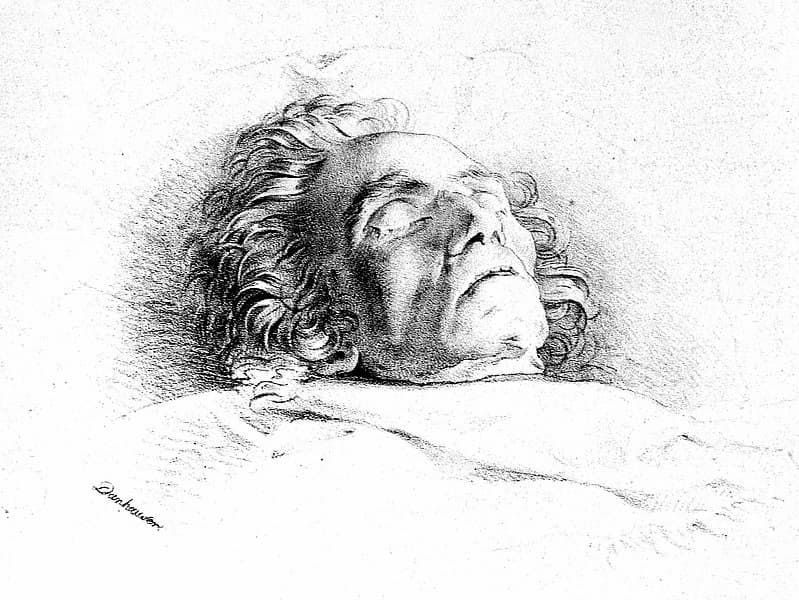
Beethoven on his deathbed
“I shall hear in heaven.” Despite Classic FM having turned this into a viral graphic to post on social media, there’s no evidence at all that Beethoven ever said this.
“Plaudite, amici, comedia finita est,” or, in English, “Applaud, my friends, the comedy is over,” a phrase that often appears at the end of Italian Commedia dell’arte.
These last words were reported by Beethoven’s secretary Anton Schindler in his 1840 memoir; however, to be pedantic about it, Schindler merely claimed Beethoven said them on his deathbed, not that they were his last words, period.
And unfortunately, Schindler later became famous for falsifying all sorts of information about his association with Beethoven, so we’ll likely never know if he was telling the truth here.
Generally speaking, historians have settled on “Pity, pity, too late” as Beethoven’s final words, uttered after he received a case of wine from his publishers and realized he’d never recover enough to drink it. A bit ironic, maybe, given that the liver damage that hastened his death was likely caused in part by overconsumption of alcohol!
Hector Berlioz
In his monumental two-volume biography of Berlioz, writer and historian David Cairns reports that the composer’s final words were, “They are finally going to play my music.” He wasn’t wrong!
Johannes Brahms
Brahms was very ill with liver cancer in April 1897. His doctor’s son – also a physician – was at his bedside as he grew weaker and overnight offered Brahms some wine. Brahms tasted it and said, “Ah, that tastes good.” Soon afterward, he lapsed into unconsciousness and died.
Frédéric Chopin
For a variety of reasons, Chopin’s early death from tuberculosis has been romanticized and mythologized from here to eternity. Accordingly, there is a truly astonishing array of supposed last words from Chopin.
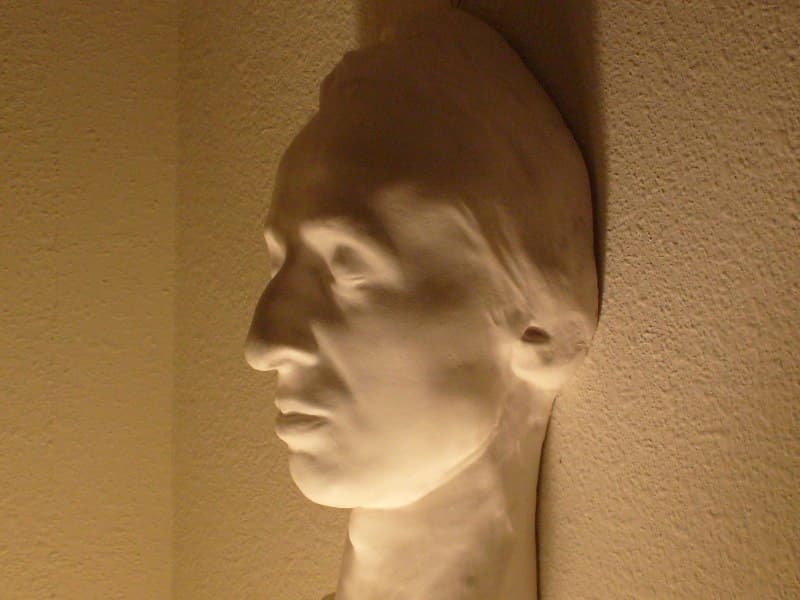
Chopin’s death mask © Wikipedia
One legend claims he said, “Now is my final agony. No more,” after a singer friend sang a selection for him at his deathbed. No word as to where this testimony came from.
“The earth is suffocating… As this cough will choke me, I implore you to have my body opened, so that I may not be buried alive.” This one rings true, as his sister Ludwika did indeed order his body opened and brought his heart back to Poland in a container so that it could be buried there.
“Mother, my poor mother.”
One dramatic account of his death claims that he clutched a crucifix and cried, “Now I am at the source of blessedness!” However, singer Pauline Viardot threw scornful cold water on this legend, claiming that priests irritated him, forcing him to kiss relics that he did not want to as he struggled to take breaths.
“Cher ami!”, supposedly said to his friend and pupil Adolphe Gutmann after he helped him take a drink.
Franz Liszt
According to an 1886 New York Times article that appeared six weeks after his death, Liszt’s last word was “Tristan” – presumably a reference to his daughter Cosima’s husband, Richard Wagner, who had recently passed away himself, and who had written the famous opera Tristan und Isolde.
There’s a dark twist to this story. A recently unearthed diary written by Liszt’s piano student Lina Schmalhausen describes how Cosima, whose relationship with Liszt was strained, ignored her father as he died.
Schmalhausen claimed that Liszt’s last words weren’t words at all but rather screams of terror as he suffered hallucinations.
That said, she also reported that he mumbled praise for Wagner’s work on his deathbed, so maybe the “Tristan” rumor isn’t too far off the mark.
Wolfgang Amadeus Mozart
The memoirs of his wife’s sister, Sophia, provide us with our best knowledge of Mozart’s last words.
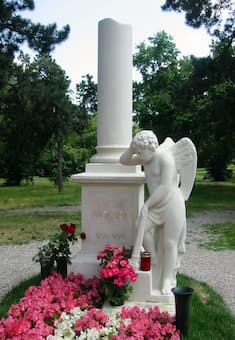
Gravestone of Mozart at St. Marx Cemetery, Vienna, Austria
Sophia wrote of coming to visit her sister and entering the sickroom.
“I tried to control myself and went to his bedside. He immediately called me to him and said: ‘Ah, dear Sophie, how glad I am that you have come. You must stay here tonight and see me die.’ I tried hard to be brave and to persuade him to the contrary. But to all my attempts he only replied: ‘Why, I have already the taste of death on my tongue.’”
After this, Sophie claimed, the doctor “ordered cold poultices be placed on Mozart’s burning head, which, however, affected him to such an extent that he became unconscious and remained so until he died. His last movement was an attempt to express with his mouth the drum passages in the Requiem. That I can still hear.”
Igor Stravinsky
In April 1971, composer Igor Stravinsky was 88 years old and the proud new owner of a ten-room apartment at 920 Fifth Avenue in New York City.
He worked with a personal manager named Lillian Libman, who was with him when his nurse wheeled him around his lavish new apartment with the fabulous views of Central Park.
According to the New York Times, the last words Libman remembered Stravinsky saying are “How lovely. This belongs to me, it is my home.” Days later, he died of heart failure.
For more of the best in classical music, sign up for our E-Newsletter

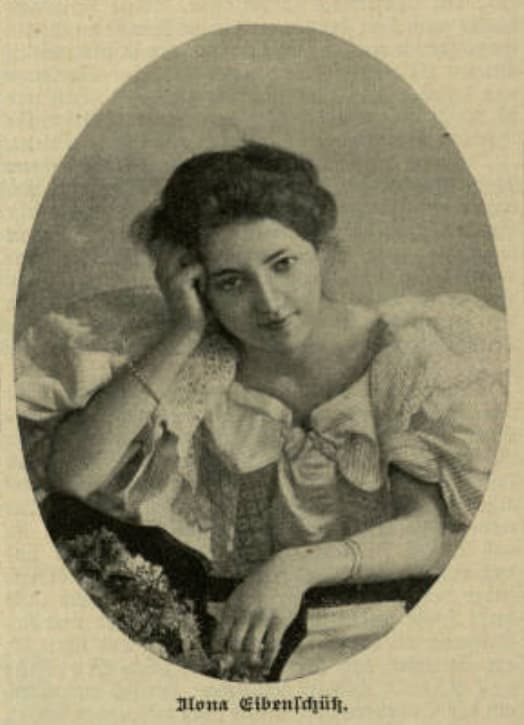
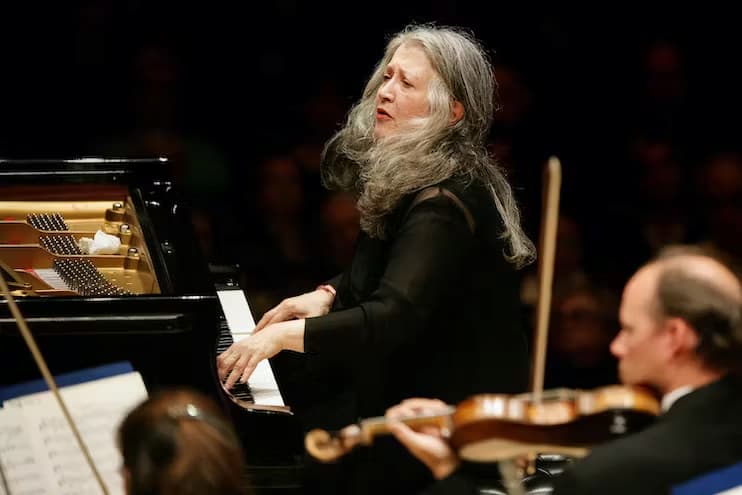
Nice to have the last words organized and well annotated. Regarding Liszt…as I am reading
Lina Schmalhausen memoir., the attitude and disdain to the human race and “smaller” people (something she had in common with Wagner) rings absolutely true given other input. This small book is edited by Alan Walker., an authority.
The Stravinsky segment rings funny, yet it probably reveals his contradictions. So he dies in New York, but wants to be buried in Venice…”near his baroque composers”. He lies there.
It is me. Just read what I wrote and something very important is missing “Cosima Wagner’s” attitude and disdain….etc. Horrible human being…as husband in many issues
Minunate informații despre marii compozitori ai muzicii culte!